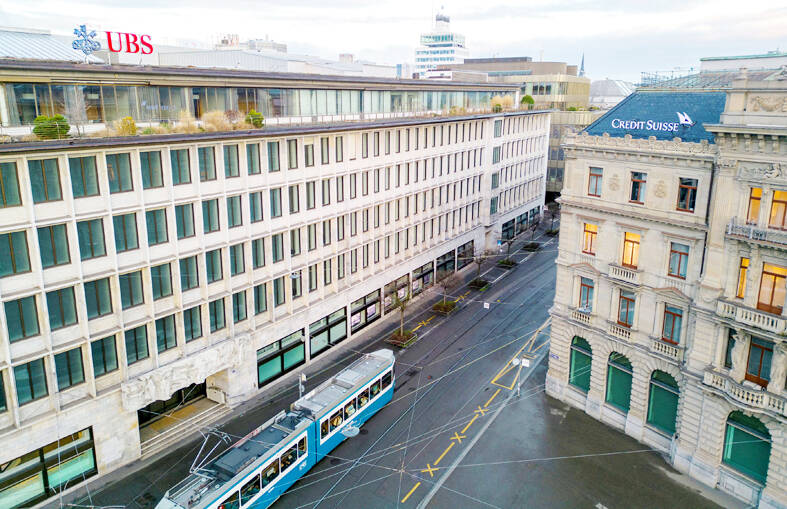The merger between Credit Suisse Group AG and UBS Group AG could result in up to 36,000 jobs being cut across the world, the SonntagsZeitung weekly reported yesterday.
The takeover by UBS of Credit Suisse in a US$3.23 billion deal was hastily arranged by the Swiss government on March 19 to prevent a global financial meltdown, following fears of contagion from the collapse of banks in the US.
UBS on Wednesday announced it would bring back former CEO Sergio Ermotti to handle the huge risks involved in the Swiss banking giant’s controversial absorption of its troubled rival Credit Suisse.

Photo: Reuters
The SonntagsZeitung report said management was mulling cutting 20 to 30 percent of the workforce, meaning between 25,000 and 36,000 jobs.
Up to 11,000 jobs could be cut in Switzerland alone, it said, citing internal anonymous sources.
Before the merger, UBS and Credit Suisse had employed slightly more than 72,000 and 50,000 people respectively.
UBS and Credit Suisse, the second-biggest bank in Switzerland, were among the select banks around the world considered to be “global systemically important financial institutions” and therefore deemed too big to fail.
UBS chairman Colm Kelleher said last week: “There’s a huge amount of risk in integrating these businesses.”
Meanwhile, Norges Bank Investment Management is to vote against the re-election of Credit Suisse chairman Axel Lehmann and six other directors at the Swiss lender’s annual general meeting on Tuesday, the Norwegian wealth fund said on its Web site.
“Shareholders should have the right to seek changes to the board when it does not act in their best interest,” it said.
In addition to Lehmann, Norges is also opposing re-election of Credit Suisse directors Iris Bohnet, Christian Gellerstad, Shan Li (李山), Seraina Macia, Richard Meddings and Ana Pessoa.
Credit Suisse declined to comment, and UBS did not immediately respond to a request for comment.
Additional reporting by Reuters

CHIP WAR: Tariffs on Taiwanese chips would prompt companies to move their factories, but not necessarily to the US, unleashing a ‘global cross-sector tariff war’ US President Donald Trump would “shoot himself in the foot” if he follows through on his recent pledge to impose higher tariffs on Taiwanese and other foreign semiconductors entering the US, analysts said. Trump’s plans to raise tariffs on chips manufactured in Taiwan to as high as 100 percent would backfire, macroeconomist Henry Wu (吳嘉隆) said. He would “shoot himself in the foot,” Wu said on Saturday, as such economic measures would lead Taiwanese chip suppliers to pass on additional costs to their US clients and consumers, and ultimately cause another wave of inflation. Trump has claimed that Taiwan took up to

A start-up in Mexico is trying to help get a handle on one coastal city’s plastic waste problem by converting it into gasoline, diesel and other fuels. With less than 10 percent of the world’s plastics being recycled, Petgas’ idea is that rather than letting discarded plastic become waste, it can become productive again as fuel. Petgas developed a machine in the port city of Boca del Rio that uses pyrolysis, a thermodynamic process that heats plastics in the absence of oxygen, breaking it down to produce gasoline, diesel, kerosene, paraffin and coke. Petgas chief technology officer Carlos Parraguirre Diaz said that in

SUPPORT: The government said it would help firms deal with supply disruptions, after Trump signed orders imposing tariffs of 25 percent on imports from Canada and Mexico The government pledged to help companies with operations in Mexico, such as iPhone assembler Hon Hai Precision Industry Co (鴻海精密), also known as Foxconn Technology Group (富士康科技集團), shift production lines and investment if needed to deal with higher US tariffs. The Ministry of Economic Affairs yesterday announced measures to help local firms cope with the US tariff increases on Canada, Mexico, China and other potential areas. The ministry said that it would establish an investment and trade service center in the US to help Taiwanese firms assess the investment environment in different US states, plan supply chain relocation strategies and

Japan intends to closely monitor the impact on its currency of US President Donald Trump’s new tariffs and is worried about the international fallout from the trade imposts, Japanese Minister of Finance Katsunobu Kato said. “We need to carefully see how the exchange rate and other factors will be affected and what form US monetary policy will take in the future,” Kato said yesterday in an interview with Fuji Television. Japan is very concerned about how the tariffs might impact the global economy, he added. Kato spoke as nations and firms brace for potential repercussions after Trump unleashed the first salvo of